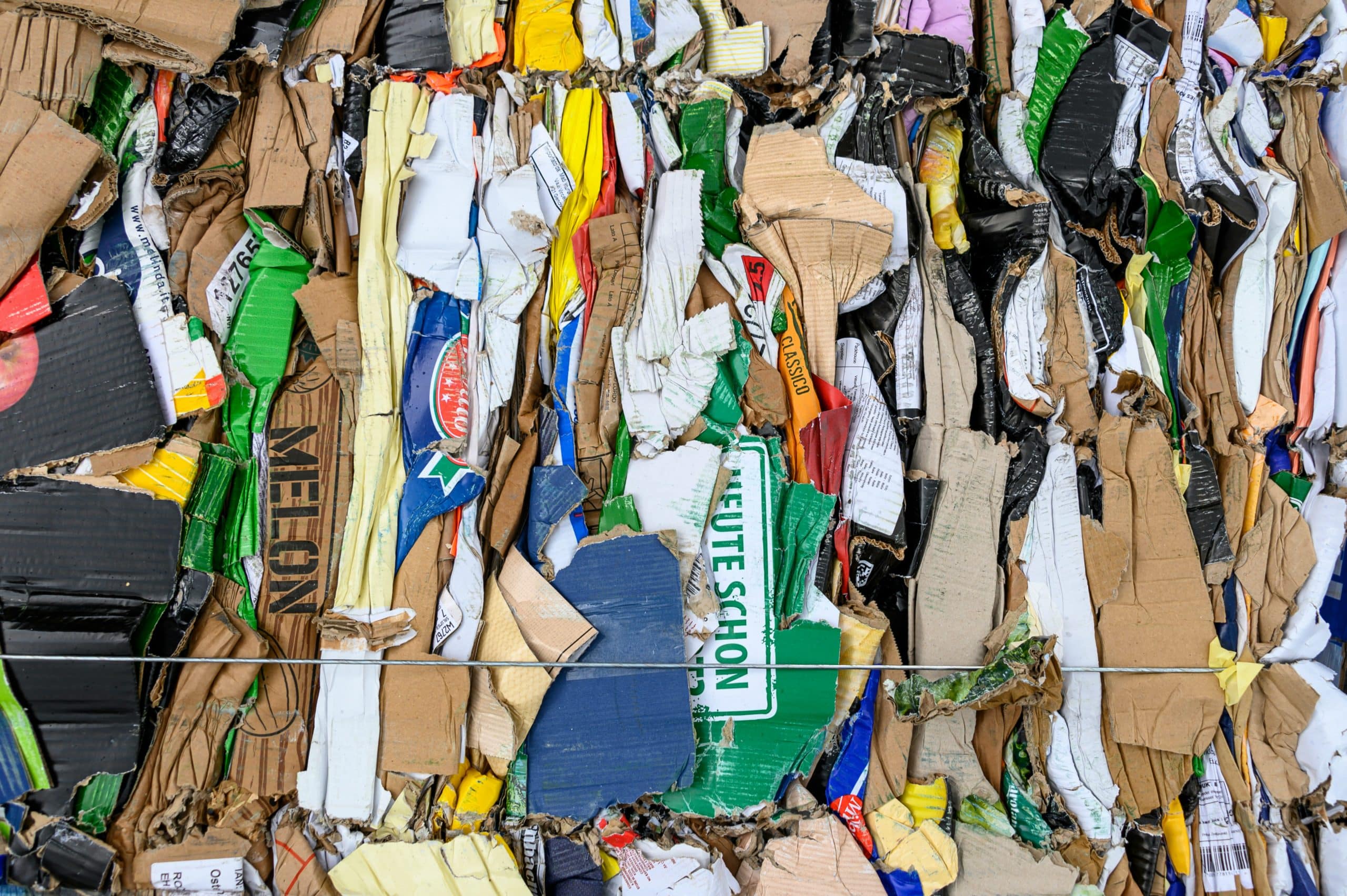Why is it important?
Waste generation is increasing across the world and is expected to reach 3.4 billion tons per year by 2050. (1) Waste landfilling generates methane emissions (CH4) while incineration liberates CO2, in various proportion according to the technics used. Furthermore, the dumping of waste without treatment pollutes lands, water, ocean, air and affects biodiversity. This is a particular challenge in regions where waste management infrastructures are dysfunctional or not available.
What is the solution?
Recycling reduces greenhouse gas emissions, local contamination of soil, water resources and air. Recycling waste in contexts where the waste management system is not fully operational is possible. It requires proper information and adaptation.
In most contexts, a local waste recycling economy exists, through informal sector like local waste collectors and associations involved in upcycling, or through formal recycling companies. Depending on the context, recycling can have different meanings: manufacturing materials to make another product (ex: recycling virgin paper into recycled paper), making handicrafts, exporting waste to another country so that it can be manufactured (ex: plastic bottle flakes) etc.
The solution starts with understanding the type of waste that can be recycled, the existing network, capacities and opportunities. Then, consider creating bridges and eventually seek partners to fill gaps. Last, organise the waste collection, sorting, storing according to the treatment identified. Of course, avoid or reduce the waste that cannot be locally recycled.
For headquarters of organisations based in the “Global North”, recyclable waste streams are easily available and could be systematically integrated into waste management practices.
See dedicated factsheet for waste from electrical and electronic equipment (WEEE).
Points of attention
Select the material used with recycling in mind. Not all materials are recyclable and actually recycled.
Dropdown
Materials usually recyclable like metal, glass, PET, HDPE, PP
Materials such as carboard, paper, plastic PET (2) (ex: water bottles), HDPE (3) (ex: jerry cans, plastic pallets), PP (4) (ex: woven rice bags), as well as aluminium and steel can usually be recycled. Some materials can be recycled over and over again (ex: glass, some metal) while others lose their qualitative value during the recycling process and can only be recycled a limited number of times (ex: PET plastic).
Soft plastic and textiles difficult to recycle
Soft plastics (ex: LDPE (5) such as shrink wrappers) or textile (which are rather reused) are not usually recycled because they have a low economic value and/or because there is no separated collection system in place.
Electronic waste and batteries recyclable after treatment
Electronic waste and batteries have high potential for recycling; however, they should be recycled with precautions for people or the environment (see WEEE solution factsheet)
“Green” alternative plastic difficult to recycle
Alternatives to conventional plastics (e.g., biodegradable, compostable or bio-based plastics), multi-layered packaging (ex: metalized sachets), as well as coated cardboard/paper, coloured PET are very difficult to recycle in humanitarian contexts and should be considered carefully – see this guidance note for more information.
Resin Identification Codes (RIC) indicate the type of plastic used
RIC shown on plastic items and packaging indicate which material it is made of and therefore can help identify adequate recycling opportunities (see Palladium example). (6)
Image

Key actions
-
#1 Assess
Assess local recycling opportunities (see environment ministry or humanitarian logistics clusters, but also informal sector like individual collectors and associations). Identify recyclable items using Resin Identification Codes (12). A global database (13) on formal recyclers has also been developed which can help you identify which company you can partner with, while seeking other actors locally.
-
#2 Procure items that can be recycled
Integrate recycling information in procurement processes. Avoid non-recyclable items that will end up in landfill or incinerators. Choose plastic items indicating the Resin identification codes (14). Prefer brown, recycled carboard/paper instead of white (bleached) ones. Avoid single-use plastic.
-
#3 Sort and store recyclables
Sort recyclable wastes as recommended by recycling companies and regulations. Use different types of disposal containers and encourage their use. Group and store wastes with other partners to reach larger quantities collected at once.
-
#4 Pre-processing
Pre-process the waste as recommended by the recycling companies: remove labels, and wash, compact, bale, or shred recyclable items accordingly. It requires equipment, time, and space, but it will increase the value and possibility to generate income for the informal sector.
-
#5 Develop partnerships with recyclers
Establish partnerships with local recyclers, whether they are informal waste collectors, resellers or formal companies. Very few recyclers will cover the whole range of recyclable waste, so specific partnerships for each material may need to be established accordingly.
-
#6 Optimise storage and transport
Mutualise storage/transport of recyclable waste with other organisations.
Set a reverse logistic system to organise the collection and shipment back to recycling/reuse or disposal facilities). Include it in the budget. Read UNHRC study (15) on solar lantern recycling providing operational cost estimates.
-
#7 Inform and train teams and partners
Make sure the staff in general, and cleaning personnel and purchasers in particular, are well informed in how to recognise recyclable items from non-recyclable items and are confident in sorting them accordingly.
To consider
-
Potential co-benefits
- Possible informal sector revenue and development of a circular economy. (16)
- Economy of raw materials
-
Success conditions
- Check recycling companies regularly to avoid corrupted or other unethical practices (child labour/uncontrolled landfill)
- Sort and store waste properly – companies are more likely going to collecting recyclables.
- Dedicate time, storage space and equipment (machinery to pre-process, containers, etc).
-
Prerequisites & specificities
- Recycling is context specific: check the existing market, local environmental legislation and waste management capacities: one item may therefore be recycled in one country and not in another.
-
Potential risks
- Poor working conditions, health and safety risks for workers of recycling companies. (See WREC quick assessment checklist from the Tools paragraph to understand what issues to consider (17).
- Recycling process can generate pollution from poor wastewater management (18) and require large amount of energy or water (19).
Tools and good practices
-
Mapping of waste management facilities, Logistic cluster
Logistics Cluster keeps an updated map of waste management and recyclers facilities worldwide.
Explore here -
Waste management and recycling assessment guidance (WREC), Logistic Cluster, April 2023
The Logistics Cluster is a coordination forum of the United Nations, providing logistic information and tools for humanitarian agencies. See annex II Waste Management and Recycling Questionnaire from its Waste management and RECycling (WREC) assessment guidance.
Learn more here -
Template Waste Management and recycling assessment, Logistic Cluster, 2022
This questionnaire guides you to assess the existing recycling and waste management facilities in your country of intervention.
Explore here -
Options for reuse, repurposing and recycling Humanitarian packaging, Joint Initiative for Sustainable Humanitarian Assistance Packaging Waste, June 2023
The Joint Initiative for Sustainable Humanitarian Assistance Packaging Waste Management is a project funded by USAID uniting 21 humanitarian stakeholders to reduce the negative environmental impact of humanitarian action, particularly by tackling the issue of packaging waste. They propose alternatives to plastic and recycling options.
Learn more here
To go further
-
Scrap dealers help humanitarian organisations to collect recyclable
How humanitarian organisations engaged scrap dealers to collect recyclable materials in Bangladesh, contributing to reduce the negative environmental impact of the humanitarian response.
Learn more -
Recycling technics: a possible danger for health and environment
Poor or inadequate waste management in developing countries affects the environment, population health, and sustainable development.
Learn more -
Informal sector: an effective recycling actor, with a cost for health and environment
The effectiveness of waste recycling by informal sector in developing countries, and its cost for human and planetary health.
Learn more



